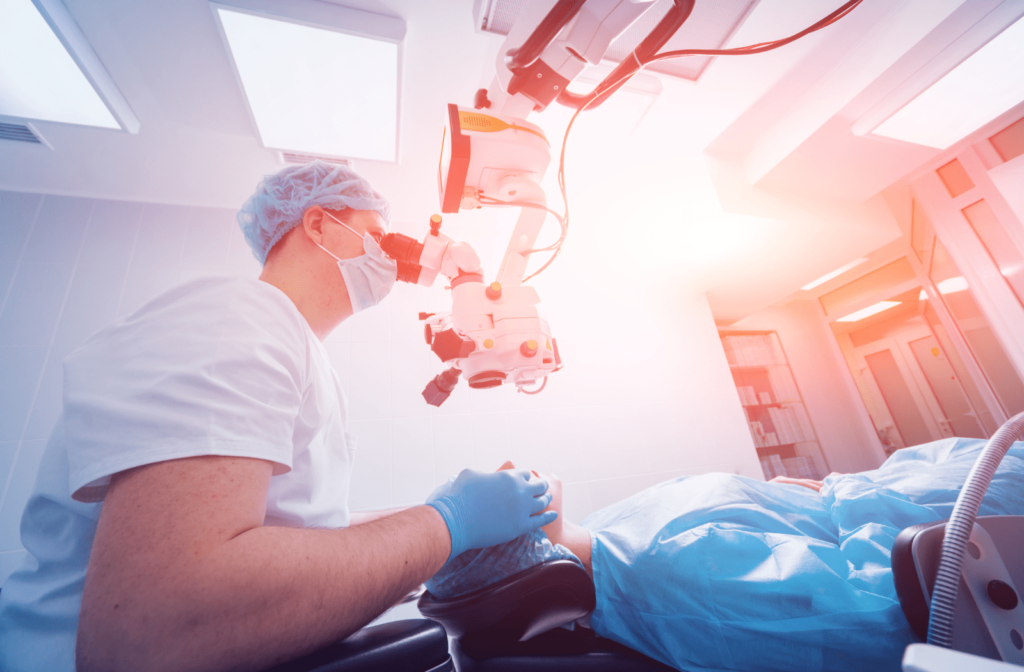Your visual health is essential to preserve, and that begins with consistent eye exams with your optometrist. An eye exam can do more than just update your prescription—it can also help in the early detection and treatment of eye diseases such as cataracts.
Cataracts require surgery to remove, and you may be wondering what activities you should avoid following surgery. Let’s explore how cataracts develop, the surgery process, and your outlook following the procedure.
Getting to Know Cataracts
Cataracts develop when the eye’s normally clear lens becomes clouded. This clouding of the lens can prevent light and images from reaching the retina.
Cataract formation begins when proteins form clumps that can prevent the lens from sending clear signals to the optic nerve. The optic nerve is responsible for sending signals to your brain and providing vision.
Common signs and symptoms of cataracts can include:
- Clouded, blurred, or dim vision
- Sensitivity to light and glare
- Colors appearing faded or yellow
- Double vision in the affected eye
Cataracts usually occur as you age, and development can depend on various risk factors such as:
- Diabetes
- Smoking
- Obesity
- Previous eye injuries
- High blood pressure
- Genetic factors
Cataract development is a gradual process that does not occur overnight. The symptoms can also be gradual and may not be noticeable until cataracts become more advanced.
However, when cataracts begin to affect your daily life and prevent you from going about your daily activities, such as reading or driving—surgery is the only option to remove them.
Cataract Surgery & Prevention Methods
Simple lifestyle changes can help reduce the likelihood of developing cataracts at a young age, such as:
- Wearing UV protective sunglasses
- Not smoking
- Eating a balanced and nutritious diet
- Regular eye exams
However, when cataracts begin to affect your daily life and prevent you from going about your daily activities, such as reading or driving—surgery is the only option to remove them.
During cataract surgery, your surgeon will remove the cloudy natural lens from the eye and replace the natural lens with a permanent artificial intraocular lens implant to restore focusing power.
Activities to Avoid After Cataract Surgery
While cataract surgery is usually a quick procedure, there are some precautions you must take following surgery. Your optometrist will work with your surgeon to lay out specific aftercare instructions for you. Let’s explore some general guidelines to follow after your surgery.
Driving
Driving immediately after surgery is not recommended, and you should arrange to have someone drive you home ahead of time. While you may be able to drive a little while after surgery, you should consult your optometrist first to get a specific timeline to be safe.
Exercising
Your optometrist can provide the best advice regarding exercising after surgery. Still, intense activity should generally be avoided to allow time to heal.
In the week following your surgery, you should opt for low-impact physical activities, such as:
- Walking outdoors
- Gentle walking on a treadmill
- Light household chores
- Gentle stretching
You should also avoid bending and lifting anything too heavy that can increase pressure in your eyes and interfere with the healing process.
Taking Days Off from Work
Getting back to work is a priority for most people, and you’ll feel good enough to get back to work within a few days of surgery, barring any post-surgery complications.
However, it does depend on the kind of work you do and how intensive it is on your body. Avoiding heavy lifting or bending over can help streamline the recovery process.
Other General Activities
Some other general recommendations to protect your eyes following surgery include avoiding:
- Getting water and soap in your eyes
- Swimming
- Dusting and gardening
- Touching your eyes
- Using face cream or lotion
- Using hot tubs and saunas
Avoiding these activities can help accelerate healing and get you back to your daily routine.
Prioritizing Your Eye Health
Your optometrist is in your corner to help navigate the cataract process from development and treatment to helping co-manage recovery. Avoiding certain activities can help streamline the recovery process and get you back to optimal vision levels quickly.
Book an appointment with your optometrist today to learn more about the process and get a comprehensive eye exam.



